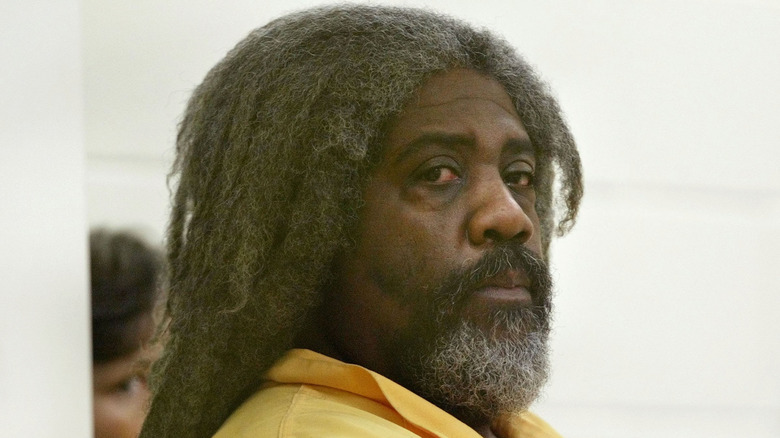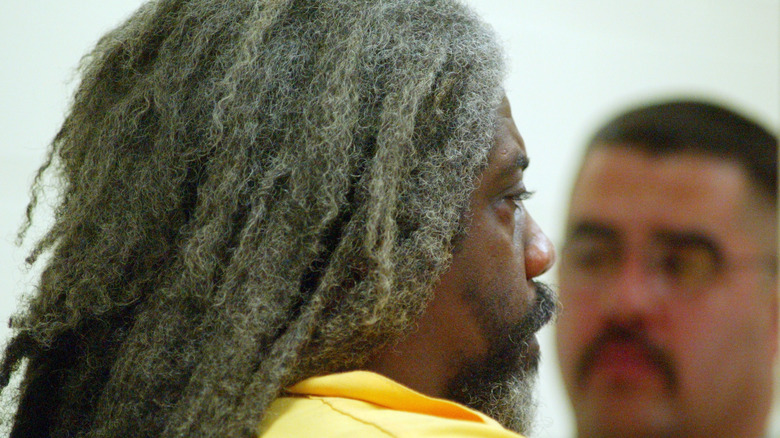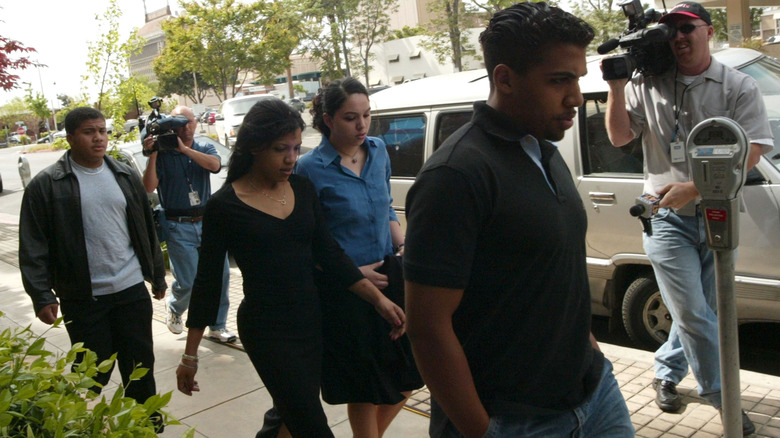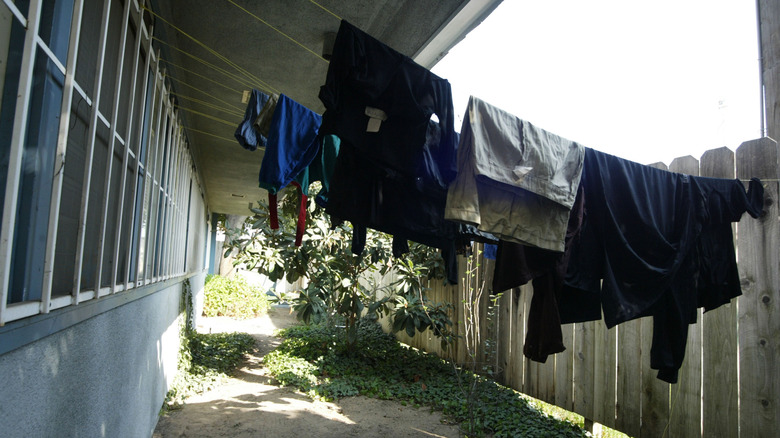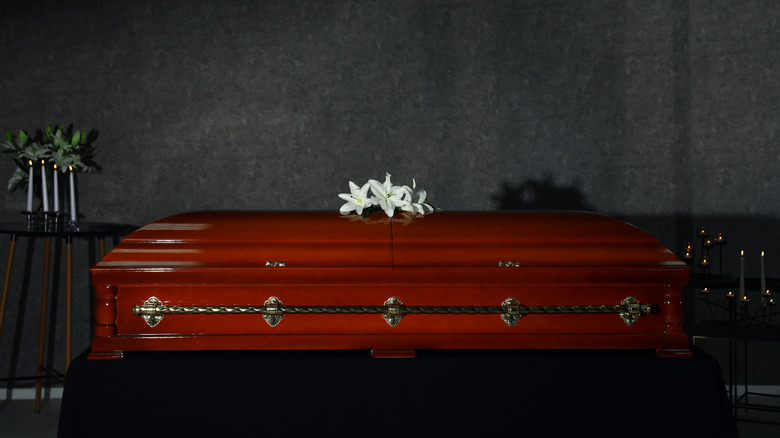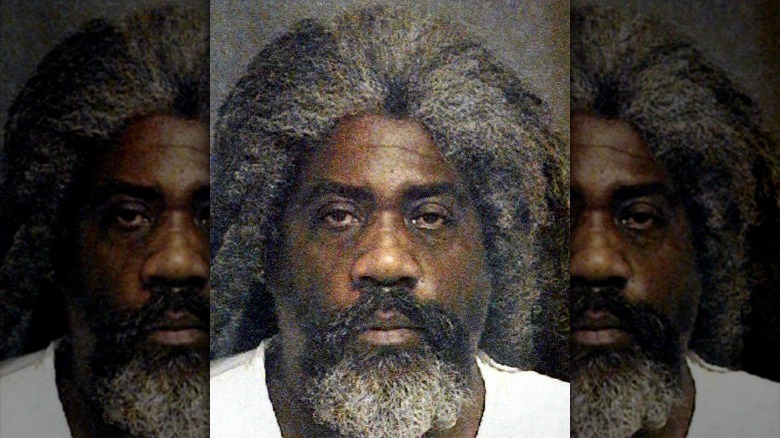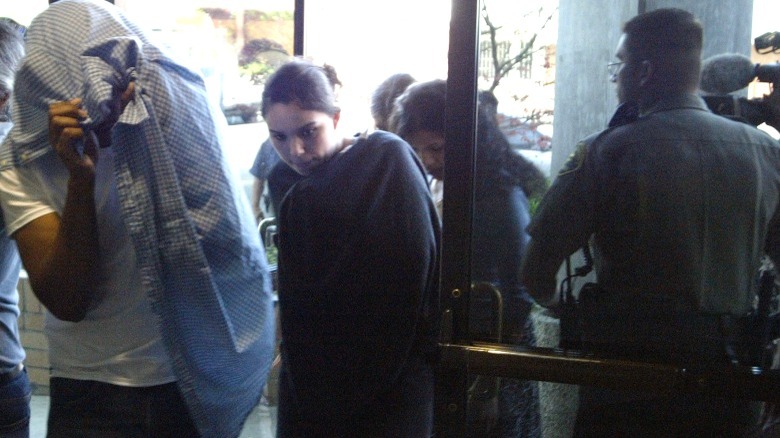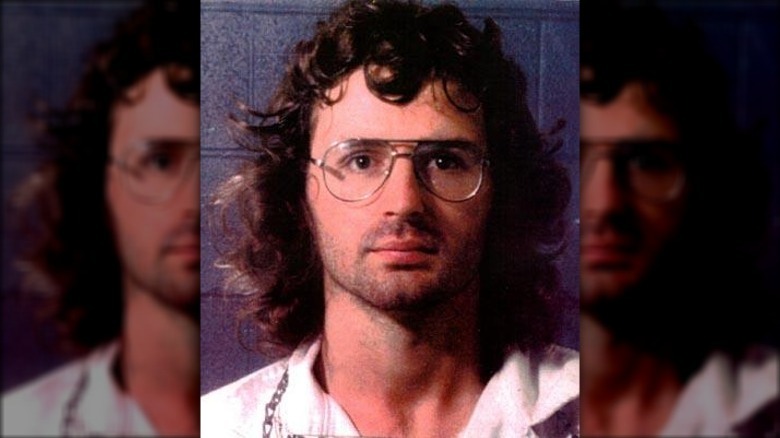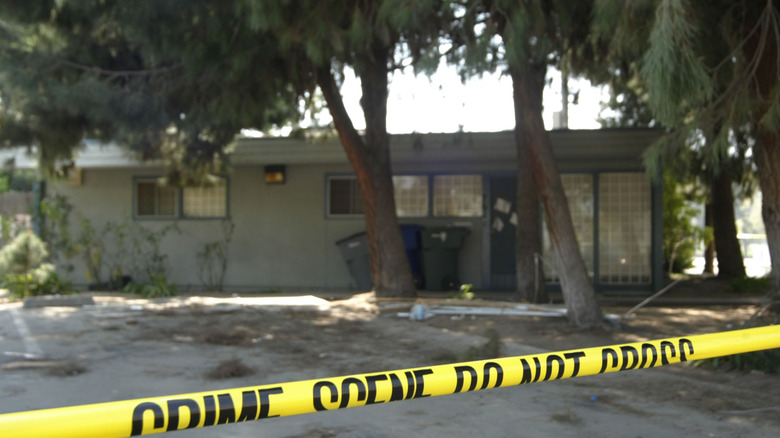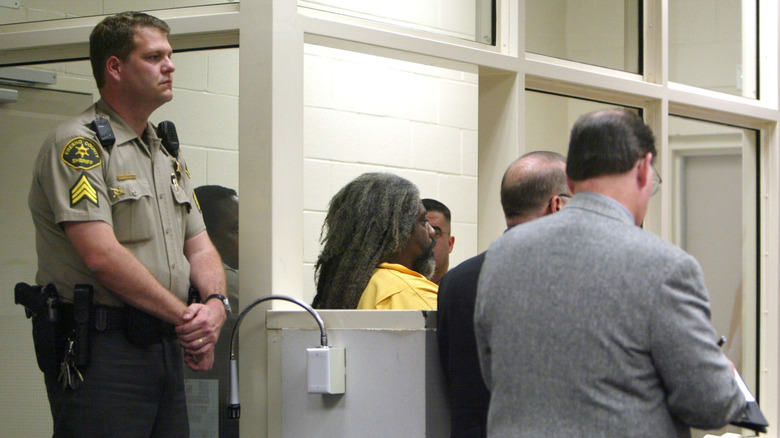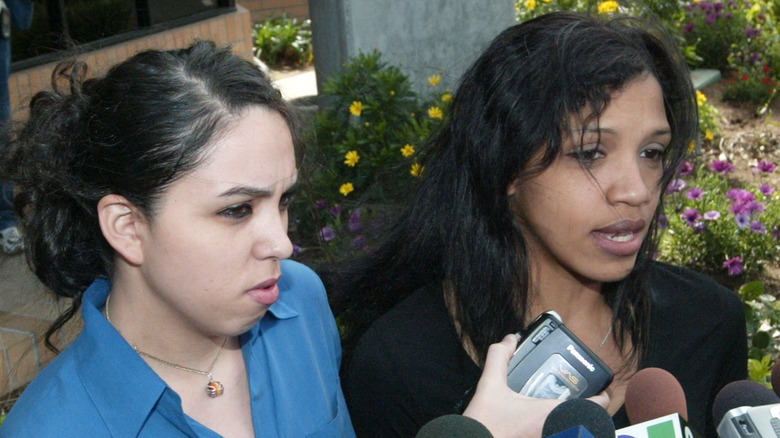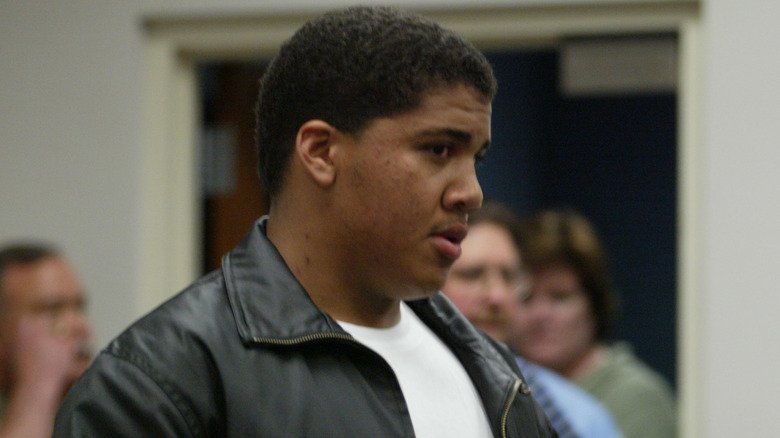Disturbing Details About Marcus Wesson And His 'Vampire' Cult
In Fresno, California, during the early 2000s, an apparent dispute over child custody began to heat up just outside of the home of Marcus Wesson. People were yelling, police were called, and suddenly, gunshots were heard piercing the air. The argument had turned deadly, and Wesson was arrested for the murder of nine of his children.
That's already a horrific tale, but as the details of exactly what was going on under Wesson's roof began to see the light of day, it only got worse, and the realities of the situation almost started to sound like fiction. Brainwashing, incest, abuse, twisted religious beliefs, and a disturbing fascination with blood — all of that is just the general overview of the horrors faced by Wesson's family at his hands. All taken together, it paints a rather dark and terrifying picture, one which the surviving members of the Wesson family have had to heal from in the years since.
The following article discusses sexual abuse and child abuse.
Marcus Wesson had an unstable childhood
When it comes to cult leaders and murderers, there seems to be a pretty common type of question that goes around: What made them like that? What kind of childhood could lead a person down a path drenched in blood?
With Marcus Wesson, though, there's not a whole lot that can be said with certainty. He was raised in a particularly religious household, courtesy of his mother, who regularly preached to her kids about the Second Coming and was herself an ardent Seventh-Day Adventist. And when it came to his father, it would be putting it lightly to say that things were pretty messy. Wesson's father was an alcoholic who couldn't hold down a job and ultimately spent a fair amount of time away from his family, both due to living with a nephew and as a result of a number of affairs.
Such an unstable household was ultimately mentioned in court as a way to perhaps understand Wesson's actions, but the argument couldn't hold much water — after all, there just wasn't really much more information to form a stronger argument. By the time Wesson's crimes were discovered, his father was dead, his mother was sick, and his siblings weren't keen on explaining things in further detail.
His family included a lot of kids
Marcus Wesson's family tree is a complex thing, and that's for the worst of reasons. To start from the beginning, he began a relationship with Rose Solorio, a woman 13 years his senior and already the mother to eight other kids. The two of them had a son together, but then Wesson turned his eye to Solorio's daughter, Elizabeth. With Solorio's apparent consent, Wesson married Elizabeth; he was 27 at the time, and she was only 15. Elizabeth then gave birth to nine more kids — five boys and four girls (though in later testimony, she actually claimed to have had 11 kids, despite only naming nine of them).
That was far from the end when it came to kids, though. Despite already having at least children of his own, Wesson also ended up taking in seven more kids, all of whom had been born to Elizabeth's sister. The Wesson clan had grown in number rather suddenly, and once the kids started getting older, the family started growing once again. More specifically, Wesson began to sexually abuse his daughters and nieces from a young age, resulting in more children.
If you or anyone you know has been a victim of sexual assault, help is available. Visit the Rape, Abuse & Incest National Network website or contact RAINN's National Helpline at 1-800-656-HOPE (4673).
Money was always tight
Regardless of the exact situation, when you've got a family with a number of kids that goes into the double digits, then that's a lot of mouths to feed. A situation like that would require at least a decent amount of income in order to support a family that large — not the easiest set of circumstances. But it was ultimately made all the worse by the fact that Marcus Wesson refused to work.
Granted, he had done work in the past, serving as a medic during the Vietnam War and then spending some amount of time employed as a bank teller. But that's really it when it comes to his work history. For about 30 years, he subsisted entirely on welfare checks coming in from the government, and when asked why he wouldn't find a job, wife Elizabeth Wesson gave a rather unhelpful answer during Marcus' trial: "You can't work if you are on welfare" (via Cult Education Institute). But that wasn't all, as he also said that it was his duty to keep his religious beliefs secret — by isolating from the rest of the world.
Unsurprisingly, Marcus' views of money affected the rest of the family negatively. Elizabeth also didn't work, as she'd been led to believe that her place was purely in the home, being a loyal housewife. And the kids often found themselves going to bed hungry, with his daughter Kiani Wesson reading a journal entry during her father's trial: "I hope we make it today. I can't go any longer" (via CNN).
The family lived in many different places
With Marcus Wesson's family often forced to subsist on nothing more than welfare checks, it comes as little surprise to know that their housing situation was far from ideal and also far from stable.
The family moved around a lot over the years. Initially, Wesson started by living with his parents up in San Jose, California, but that didn't last too long, with his family getting uprooted and shuttled around different parts of the state, from Santa Cruz to Fresno. But where exactly the family laid their heads at night is something of a different — and stranger — question. Immediately after moving out from Wesson's parents' home, the family did rent a house, but their living conditions quickly deteriorated from there, finding them living at times in a tent, a motor home, and a trailer. They even spent some time living on a boat that Wesson reportedly paid for by saving up money from his welfare checks (a purchase that led to quite a slew of legal questions and odd mysteries).
By the time Wesson was arrested, the family was living in the city of Fresno, specifically taking shelter in an abandoned office building that they'd converted into a home. But that's hardly the strangest part of the story; there were a number of caskets in that home of theirs. Members of the Wesson family claimed they'd been purchased purely for the wood they could provide, though they also admitted that they doubled effectively as beds.
Marcus Wesson had some strange religious beliefs
There's plenty of dark stuff when it comes to the story of Marcus Wesson, and his religious beliefs are just one of those strange facets. To put it bluntly, Wesson was really invested in this particular overlap between vampires and religion, even going so far as to claim that Jesus Christ was (or at least was similar to) a vampire. As he saw it, both Christ and vampires shared a very special trait: immortality.
But then things started getting even more twisted, with Wesson taking these ideas of vampires and forcing them on his family. His children were referred to as "fledglings," and all members of the family were given monikers that they called "vampire names." Wesson's niece Sofina Solorio was called "Vampiress Tahla," his son (with daughter Kiani Wesson) was called "Jeva" (a portmanteau of "Jesus" and "vampire"), and Wesson referred to himself as "Je Vam Marc Sus Pire." Wesson would then preach his twisted versions of the Bible, even going so far as to draw convoluted parallels between the blood of Christ and that of vampires — a connection that led to a fascination with the idea of drinking blood. And that was no passing fancy; Wesson even wrote a fictional scene featuring a version of himself snapping the neck of a victim before drinking their blood, referred to in his story as "precious fluid" (via Monte Francis' "By Their Father's Hand").
He claimed that religion justified incest and abuse
As information started coming out about Marcus Wesson, it pretty quickly became clear that he had complete control over his family, and he was using that control to sexually abuse his children. According to his daughters and nieces, from as young as age 8 or 9, he began to force himself onto them, kissing and touching them — behavior that would eventually escalate to actual sexual intercourse while they were still children. He'd then take it even further, staging wedding ceremonies between himself and his daughters and nieces.
He had plenty of excuses he gave, trying to justify why he was doing this. He convinced his daughters that he was touching them just because he loved them, or because he was preparing them for their future husbands. After his staged marriage ceremonies, he would tell them that they were really just surrogates for his wife, Elizabeth Wesson, as she couldn't have kids anymore.
But it went beyond that, too, with Marcus claiming that his religion justified everything. He would often teach the Bible to his children, though he was known to twist the words to suit his own purposes, focusing on passages that mentioned polygamy and going so far as to claim, "Jesus was a womanizer" (via CNN). And when it came to incest, he wrote down his convoluted justifications, essentially claiming that incest was either the only way to maintain a purely perfect bloodline or the way to find perfection in one's bloodline (via Monte Francis' "By Their Father's Hand").
If you or anyone you know has been a victim of sexual assault, help is available. Visit the Rape, Abuse & Incest National Network website or contact RAINN's National Helpline at 1-800-656-HOPE (4673).
If you or someone you know is dealing with spiritual abuse, you can call the National Domestic Violence Hotline at 1−800−799−7233. You can also find more information, resources, and support at their website.
He admired David Koresh
If you're well versed in your cult leaders throughout history, then there's probably a decent chance you've heard of David Koresh. If you're not, then here are the main points. David Koresh was the leader of a religious sect known as the Branch Davidians who convinced his followers to join him at a compound in Waco, Texas, and there, he convinced them he was a prophet of God. With that power, he had his followers stockpile weapons and also decided that he could wed and have children with any female follower he pleased. The stash of weapons caught the eye of the government, though, leading to a 51-day siege that ended with the fiery death of Koresh and many of his followers.
Marcus Wesson has been compared to Koresh in terms of how he exerted his control, but the connections run even deeper than that. Wesson himself was actually perfectly aware of who Koresh was and was even said to admire and support him. He apparently even referred to Koresh as a genuine "man of God" (via Monte Francis' "By Their Father's Hand") and believed that the siege initiated by the government was a grave injustice. In his eyes, it was the government who was interfering with Koresh's work, and upon seeing the fire in the news, he bemoaned, "This is how the world is attacking God's people. This man is just like me. He is making children for the Lord. That's what we should be doing, making children for the Lord" (via Cult Education Institute).
His crimes eventually caught up with him
Considering all of the things that were happening under the roof of Marcus Wesson's home, it comes as no surprise that he was eventually found out. And that was precipitated by a couple of Wesson's nieces — Sofina Solorio and Ruby Ortiz — who had actually left the family and started their own lives. At the time that they left, Marcus had agreed to have only one child with each of the women, a promise that they realized he had broken when his wife began asking them for baby formula. Combined with news that he was planning to move the entire family (including their two sons) to Washington, they knew they had to take back their kids.
On March 12, 2004, Solorio, Ortiz, and a group of their friends went to confront Marcus, only to be told to leave, and even screamed at by the other women in the house. Police were eventually called to the scene, and after some discussion with Marcus, the entire group watched as he disappeared back into the house.
And then there were gunshots. Marcus reappeared at the door, covered in blood, and the scene inside explained why. The bodies of nine of his kids living in the house (as young as 1 years old) were found piled in the back bedroom, all dead from a gunshot through the eye, and Marcus Wesson was immediately taken into custody for the murders.
The trial of Marcus Wesson
Marcus Wesson was brought into custody after walking out of his home, covered in the blood of his children, and then came his trial, during which he was faced with nine counts of murder, nine more of forced rape, and five of continued sexual abuse. Ultimately, he was found guilty on all of those counts of murder and rape, and he was subsequently sentenced to death. Since that trial, he's been sitting on death row at San Quentin.
It sounds like it would've been an easy case, but Marcus' lawyers actually tried to make the argument that he wasn't responsible. And there was actually something to their argument. Upon investigating the scene and, more specifically, the gun, it was discovered that his fingerprints and DNA weren't actually on the gun, nor was there any gunpowder residue on his hands. On the contrary, the DNA of his daughter, Sebhrenah Wesson, was found there (though there were still no fingerprints or residue). Taking that information, Marcus' defense tried to argue that Sebhrenah was actually the one to fire the gun, killing all of the kids before dying by suicide. Technically, forensics couldn't rule out that option entirely, and Sebhrenah had, in the past, shown a particular fascination for guns and weapons. But the argument didn't prove strong enough, with the prosecution pointing out that, even if he didn't pull the trigger, he had caused enough emotional and psychological damage to push his children to the point where they would commit murder.
His daughters still defended him
It's easy to look at everything Marcus Wesson did and see how deeply he was in the wrong, and that's true of any third-party observer. But when you read the experiences as recounted by his own kids — especially his daughters and nieces — those stories sound very different. Of course, there were instances where some of them knew in the moment how inherently wrongly they were being treated; Gypsy Wesson could recall the feelings of helplessness at being kept completely isolated from the world (via ABC News). But that wasn't always the case.
Many of Marcus' kids had grown up in this environment, and it was all that they had ever known. He would feed them his twisted justifications for what he was doing, and they couldn't really do anything but buy into those justifications. He made them believe it was all right.
As a result, there are plenty of instances of the girls defending him. Both Kiani Wesson and Rosa Solorio claimed that the rape accusations were inaccurate, saying, "Whatever happened in the home was by agreement and talk ... There was never any rape, nothing forcible" (via ATI). And Solorio spoke further to police, telling them, "I understand what he did and everything ... He's my father, and I do not want to be responsible for putting him away" (via Cult Education Institute).
His sons couldn't believe the news
The stories told about Marcus Wesson's crimes almost always revolve around his daughters and nieces and the abusive relationship that he had with them. He, effectively, wanted them only to himself, forcing them to dress conservatively and forbidding them from interacting with any boys. And, to some degree, that even limited the interaction that they could have with their own brothers, who actually grew up completely separately, as Marcus believed that boys and girls shouldn't be raised in the same household.
That led to quite a bit of shock after the murders and Marcus' subsequent arrest. One of his sons in particular, Serafino Wesson, voiced his disbelief, saying that, "He's such a gentle guy, I can't believe he did it" (via ATI). He talked further with the police, telling them how his father had instructed that they all cooperate and keep the peace, insisting, "There's such a thing as forgiveness. So why hate him since I don't know the truth of what happened "(via Cult Education Institute). In much the same vein, another of Marcus' sons, Dorian Wesson, only knew him as a loving and wonderful father (via ABC News).
Quite a bit of time has passed since then, though, and Marcus' sons — Serafino and Dorian included — have come to terms with the dark reality of who their father was, if they didn't already suspect something at the time.
